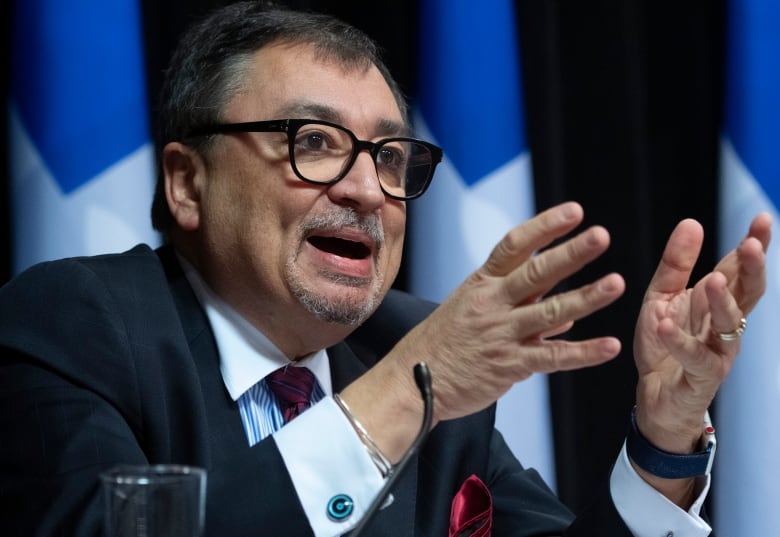As Quebec revises reopening dates, government risks adding uncertainty to uncertain times
Premier François Legault announced more delays Thursday to his plan to reopen Montreal

Quebec Premier François Legault spent two days last week outlining an ambitious timeline to reopen elementary schools, daycares and several sectors of the province's economy by the end of the month.
"Life must go on," he declared at the time.
Since then, his plan has unravelled somewhat, adding uncertainty to an already uncertain situation.
On Monday, he pushed back the opening of retail stores in the Montreal area. On Thursday, he pushed back those same store openings again and delayed the return to classrooms.
The public health case is simple. While the situation in Quebec's outlying regions is improving, transmission rates remain high in and around Montreal.
In addition, the city's hospital beds are nearly all full and there is a severe staffing shortage across the health-care network.
At the moment, Montreal hospitals simply don't have enough beds or staff to absorb a further surge in COVID-19 cases, which could happen when several hundred thousand people start heading to work and school again.
WATCH | Legault explains the rationale for pushing back the timeline for reopening Montreal:
And so instead of opening on Monday, as per the original timeline, retail stores in the Montreal area will open on May 25. Elementary schools will also open May 25, one week later than planned. All this provided the situation on the ground improves.
But Legault's explanation for adjusting his timeline also illustrates the problem with the notion that there are "two worlds" in Quebec when it comes to understanding the pandemic.
The notion is central to his argument that it is safe to ease confinement measures. It holds that while infections are rampant in long-term care centres, they are low enough outside these self-contained communities to allow people to circulate more freely than before.
This certainly describes an epidemiological reality. But it doesn't really capture the way different elements of the health-care system are connected.
Take, for example, the picture that has emerged in recent days about why hospital space is so limited in the Montreal area.
Since late March, thousands of elderly patients in long-term centres, also known as CHSLDs, were infected by the novel coronavirus. Large numbers were sent to hospitals, where fortunately many recovered.
But as they recovered, the situation in CHSLDs worsened, and health officials became reluctant to send them back.
So now, in growing numbers, they remain in hospital beds, gradually reducing the health-care system's ability to take on new patients. You end up with the current situation where, because the hospitals are full, it's potentially unsafe for Montreal to press ahead reopening schools and businesses.
There may be two worlds, but the conditions on one affect those on the other.
Quebec's timeline vs. Ontario's conditions
When it was first announced, Quebec's plan for loosening restrictions and reopening drew immediate comparison to Ontario's, which was revealed around the same time.
Quebec's approach was to establish a fixed timeline while monitoring public health conditions to see if they were promising enough to stick with the plan.
Ontario, on the other hand, opted first to establish what public health conditions needed to be met, before setting dates for reopening schools and businesses.
In both cases, political leaders have made clear they are acting in concert with public health authorities.

But the delays announced this week by Legault demonstrate how his approach can create confusion for Quebecers as protocols and procedures are hammered out on the fly.
After the dates were set for Montreal, there was a collective gulp, then a scramble to figure out the logistics and debates over what was even possible, all while experts questioned the wisdom of moving forward so hastily.
Whole electrical grids could have been powered with the energy parents expended worrying about whether it was safe to send their children back to school.
Adding to the burden?
Drawing up public policy in the middle of a pandemic is no easy task. Policy-makers are grappling with unparalleled levels of uncertainty.
"You can ask me to be perfect and to have the truth, but I won't be able to give it you," Quebec's public health director, Horacio Arruda, said during a particularly existential moment at Thursday's news conference.
He later said, "Scientists have doubts. I have doubt. I'm going to adapt. What I'm saying today will be different tomorrow."
It's a sobering point. But Legault's government, in recent days, has been fast developing a reputation for stoking confusion in an already anxious province.
In announcing plans to reopen subsidized daycares, Families Minister Mathieu Lacombe said parents who were not yet ready to send their children could keep their spots, free of charge.
Several days later, he reversed his position completely.

The government issued an order last week saying small gatherings — banned since mid-March — would be allowed so long as everyone stayed two metres apart. Twenty-four hours later, Legault told Quebecers to continue not gathering at all.
On Monday, Legault told teachers over 60 years old they shouldn't be returning to work, because the risk to their health is too high. On Wednesday, the government changed its tune, saying there was little risk to those under 70.
Quebecers, like the rest of the world, are growing accustomed to the uncertainty that's accompanied life in the pandemic. They may not appreciate their government adding to that already hefty burden.



